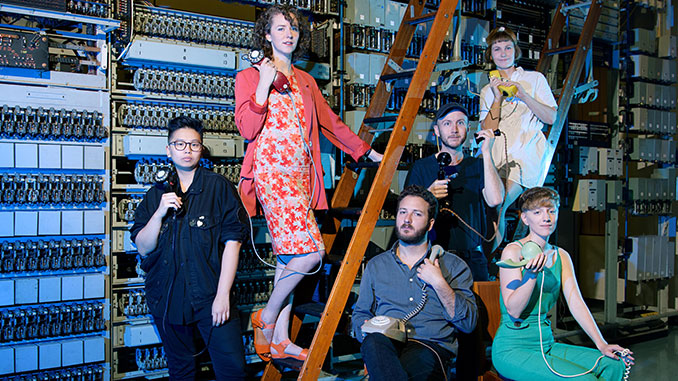 Following successes in their home cities of Sydney, Melbourne and Brisbane, six of Australia’s leading young playwrights, have come together to create The Human Voice for Meat Market Stables this March.
Following successes in their home cities of Sydney, Melbourne and Brisbane, six of Australia’s leading young playwrights, have come together to create The Human Voice for Meat Market Stables this March.
Ang Collins (Blueberry Play), Thomas De Angelis (Chamber Pot Opera), Fiona Spitzkowsky (Unicorn D*ck), Georgia Symons (Who Will Win?), Jean Tong (Hungry Ghosts) and Lewis Treston (Reagan Kelly) have collaborated on a sextuple bill (six short plays) all of which take place over the phone, exploring the ways this now ubiquitous technology influences our ability to communicate, converse and connect.
The Human Voice showcases humanity’s strangest phone-based quirks: connection to strangers when a wrong number is dialed, the awkwardness of phone-sex, and the imperfect possibilities of true connection via the phone. From the ritual of the family phone call to the uncertain menace of surveillance and privacy, The Human Voice is a unique theatrical collaboration that will change the way you think about your phone.
Directed by Benjamin Sheen (Disparate Scenes for Millennial Dreams) and presented by Periscope Productions, The Human Voice also features the experimental choir Choral Edge, who will perform original music composed by the Father/Daughter team of David and Jess Keeffe – with musical direction and additional composition from Juliana Kay.
The idea for the show came from Sheen’s fascination with a 1930 play by Jacques Cocteau, also called The Human Voice: “The original was such a simple concept: one woman speaking on the phone. But the real drama for me was how it revealed a new sort of language. We connect with people differently on the phone and it’s such an intimate space,” said Sheen.
Ang Collins has written a play about the attempt to rekindle an old relationship via a totally unexpected phone call. “The idea came to me when I was on the train back to my hometown of Newcastle,” said Collins.
“These two middle-aged characters emerged in my mind and I began to think about the phone’s potential to connect people so intimately and so immediately. How was it that two people, after such a long time apart, felt more comfortable reconnecting over the phone than they would meeting face to face?”
Playwright Thomas De Angelis has written about a young couple separated by distance hoping to use phone sex to save their ailing relationship. “I was interested in what you can get away with via a phone call because you don’t have access to body language or eye contact, and therefore it can be much easier to lie,” said De Angelis
“There was obviously comic potential in a play about phone sex, but I wanted to create a situation where phone sex is apparently essential but where neither character really wants to do it, they just think it’s what the other person wants.”
Fiona Spitzkowsky’s play sees the humble tin-can-phone making a comeback as a means of covert communication. “I find it fascinating that a simple piece of string can capture the nuance of our voices,” said Spitzkowsky.
“When I thought about it, I was a bit scared of how little I know about how phones actually work. I wanted to use the tin-can-phone as a way of examining surveillance today, but also to reflect that little sense of fear of not knowing, and how that ignorance can be manipulated.”
The focus for Georgia Symons was the ritual of the weekly phone call between a daughter and her parents. Spread across sixty years, the play examines the changing dynamic between parent and child. “The story came from my own experience living away from my parents. I wanted to create a piece in which the quotidian rhythms of the phone call take on a sort of transcendent quality, especially when they are examined over the course of a lifetime.”
Jean Tong’s play considers the phone call’s emotional costs when used for providing care and support. “I was thinking a lot about Lifeline and how one can form an incredibly strong relationship with a completely unseen person.,” said Tong.
“My play is about a character who frequently provides support to her friend over the phone, and over time we see the line between their friendship and support relationship blurred and become increasingly challenging to navigate.”
Lewis Treston’s play is about the fictional hotline, “1800-RealTalk”, which allows callers to role-play a difficult conversation with a trained operator before facing the conversation in real life. “I was interested in the idea of authentic conversation and how that works in the context of a phone call,” said Treston.
“I’ve written two characters that use language very differently and are forced to follow the rigid framework of conversation but end up just butting heads.”
Director: Benjamin Sheen Featuring: Marissa Bennett, Ross Dwyer, Alex Hines, Amarachi Okorom, Mason Phoumirath, Felicity Steel, Senuri Wagaarachchi, Chris Wallace Musical Direction: Juliana Kay Sound Design and Composition: Jess Keeffe and David Keeffe Writers: Ang Collins, Thomas De Angelis, Fiona Spitzkowsky, Georgia Symons, Jean Tong, Lewis Treston
The Human Voice
Meat Market Stables, 2 Wreckyn Street, North Melbourne
Season: 4 – 13 March 2021 (AUSLAN interpreted on 9 March)
Bookings: www.trybooking.com
Image: Playwrights Jean Tong, Georgia Symons, Lewis Tresto, Ang Collins, Thomas De Angelis and Fiona Spitzkowsky – photo by Sarah Walker
